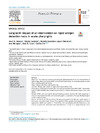Identificador persistente para citar o vincular este elemento:
https://accedacris.ulpgc.es/jspui/handle/10553/73064
| Título: | Impacto de una intervención a largo plazo del uso de una prueba antigénica rápida en la faringitis aguda | Otros títulos: | Long-term impact of an intervention on rapid antigen detection tests in acute pharyngitis | Autores/as: | Molero, José M. Cordoba, Gloria González Lopez-Valcarcel, Beatriz Moragas, Ana Losa, Juan E. Llor, Carles |
Clasificación UNESCO: | 32 Ciencias médicas | Palabras clave: | Anti-Bacterial Agents Intervention Pharyngitis Rapid Antigen Detection Test |
Fecha de publicación: | 2020 | Publicación seriada: | Atencion Primaria | Resumen: | Objetivo: Evaluar la adecuación del uso e interpretación de las técnicas antigénicas rápidas(TAR) y la prescripción antibiótica en la faringitis aguda 6 a ̃nos después de haber realizado unaintervención multifacética.Dise ̃no: Estudio antes-después basado en una auditoria.Emplazamiento: Centros de salud en 8 comunidades autónomas.Participantes: Se invitaron a médicos de familia (MF) que ya habían participado en el estudiode intervención HAPPY AUDIT en 2008 y 2009 a un nuevo AUDIT 6 a ̃nos después (2015).Método: Se proporcionaron TA R a los centros participantes, y se pidió a los MF que regis-traran consecutivamente a todos los adultos con faringitis aguda. Usamos un registro dise ̃nadoespecíficamente para este estudio.Resultados: Ciento veintiuno MF de los 210 que participaron en los primeros registros (57,6%)aceptaron a participar en el tercer registro. Se registraron 3.394 episodios de faringitis agu-das en las 3 auditorías. Se usaron TA R en el 51,7% de los casos inmediatamente después de laintervención y en el 49,4%, 6 a ̃nos después. Se prescribieron antibióticos en el 21,3%y 36,1%,respectivamente (p < 0,001), principalmente cuando había exudado amigdalar y en el 5,3 y19,2% de los resultados de TA R negativos (p < 0,001). Después de ajustar por las distintas covari-ables, comparado con la prescripción antibiótica observada justo después de la intervención,prescribieron significativamente más antibióticos 6 a ̃nos más tarde (odds ratio: 2,24 [IC 95%:1,73-2,89]).Conclusiones: Este estudio muestra que se reduce el impacto de una intervención multifacéticaa largo plazo enfocada al uso e interpretación de TA R en pacientes con faringitis aguda. Objective: This study was aimed at evaluating the appropriateness of use and interpretation of rapid antigen detection testing (RADT) and antibiotic prescribing for acute pharyngitis six years after a multifaceted intervention. Design: Before-and-after audit-based study. Location: Primary care centres in eight autonomous Communities. Participants: General practitioners (GP) who had participated in the HAPPY AUDIT intervention study in 2008 and 2009 were invited to participate in a third audit-based study six years later (2015). Method: RADTs were provided to the participating practices and the GPs were requested to consecutively register all adults with acute pharyngitis. A registration form specifically designed for this study was used. Results: A total of 121 GPs out of the 210 who participated in the first two audits agreed to participate in the third audit (57.6%). They registered 3394 episodes of pharyngitis in the three registrations. RADTs were used in 51.7% of all the cases immediately after the intervention, and in 49.4% six years later. Antibiotics were prescribed in 21.3% and 36.1%, respectively (P < .001), mainly when tonsillar exudates were present, and in 5.3% and 19.2% of those with negative RADT results (P< .001). On adjustment for covariables, compared to the antibiotic prescription observed just after the intervention, significantly more antibiotics were prescribed six years later (odds ratio: 2.24, 95% confidence interval: 1.73–2.89). Conclusions: This study shows that that the long-term impact of a multifaceted intervention, focusing on the use and interpretation of RADT in patients with acute pharyngitis, is reducing. |
URI: | https://accedacris.ulpgc.es/handle/10553/73064 | ISSN: | 0212-6567 | DOI: | 10.1016/j.aprim.2020.02.016 | Fuente: | Atencion Primaria [ISSN 0212-6567], v. 52(9), p. 637-644 |
| Colección: | Artículos |
Citas SCOPUSTM
2
actualizado el 08-jun-2025
Citas de WEB OF SCIENCETM
Citations
3
actualizado el 15-feb-2026
Visitas 5
506
actualizado el 16-ene-2026
Descargas
131
actualizado el 16-ene-2026
Google ScholarTM
Verifica
Altmetric
Comparte
Exporta metadatos
Los elementos en ULPGC accedaCRIS están protegidos por derechos de autor con todos los derechos reservados, a menos que se indique lo contrario.
